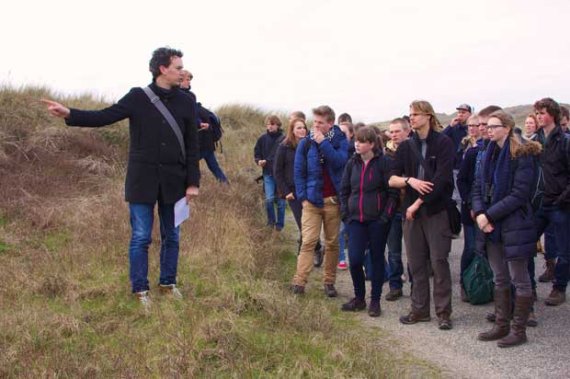The taps have been turned off for funding nature management, and organizations are feeling the pinch. One of the places affected is Den Helder, where the municipality is wrestling with the question of how to fund the upkeep of forest and dune areas in future. In search of creative, out-of-the-box solutions, they turned to the Knowledge Atelier, where students from Wageningen and elsewhere are ready to help think through problems faced in the field. The atelier has been in existence for nearly 10 years, but its portfolio of assignments has grown particularly fast in the last couple of years. ‘You should see a Knowledge Atelier as a platform which links up local government bodies, companies and organizations with students,’ explains Wageningen coordinator Ilse Markensteijn. There are several knowledge ateliers in the Netherlands which work with local training schools, originally in the environmental sector but nowadays broader than that too. Wageningen University is the only university represented among all the ateliers. According to Markensteijn, local parties make their way to the ateliers with increasing frequency. ‘There is more demand for students’ thinking capacities. Perhaps partly because current issues in the field of sustainability require new kinds of solutions.’ The system has big advantages for students too, thinks Markensteijn. ‘You can tackle a real problem, rather than a made-up case. Not only does that feel useful, it is useful.’
Stakeholders
In the Den Helder case, it was second-year BSc students of Forest and Nature Management who set to work. First they travelled to the nature area around Den Helder and talked to stakeholders. Glen Potvliet was one of the students who took part. ‘Our first impression of the area was not very good; it had not been very well maintained. But of course that immediately shows the problems faced by the area.’ The students talked to various stakeholders in the area, including entrepreneurs. Glenn: ‘By talking to the owner of a pancake restaurant, we found out that the entrepreneurs in the area were prepared to collaborate as long as they could make some money as well. That was useful information for us.’ They then started work on their own plan for making the nature areas (de Donkere Duinen and Mariëndal) viable.
Parking fees
At the end of the week, they and other groups got the chance to pitch their ideas to a jury including staff from Den Helder municipality and several experts on nature-related entrepreneurship. Glenn: ‘Our idea was to get visitors to pay for parking in the nature areas, but then to give them vouchers to catering outlets in the area. That way you make the visitors pay but you also make them feel they get something concrete back for their money. Both the municipality and the local businesses benefit by it.’ The simplicity and feasibility of the plans drew a lot of praise from the jury, and they ended up pronouncing it the best pitch. Whether it will actually be implemented remains to be seen, but Glenn looks back on the experience with pleasure anyway. According to Ilse Markensteijn, the Den Helder project is a good example of the value of the Knowledge Atelier for students. ‘The point was not just a nice project, but also to look at how to finance a plan and which parties could be involved. That means that as a nature student you suddenly find yourself sitting at the table with the owner of a pancake restaurant. That might not be what you expected when you embarked on the degree programme. But that is how it works in practice.’
28 projects
In the academic year 2012-2013, 278 students from Wageningen University contributed to 28 Knowledge Atelier projects. As well as governments, entrepreneurs and NGOs, the students also worked with research institutes, (semi-) government bodies, business people, vocational and applied science students and groups of residents.

